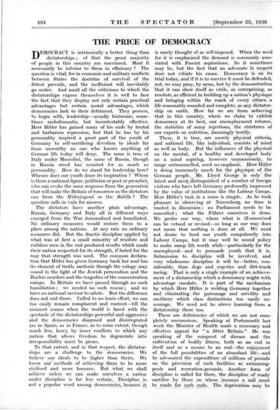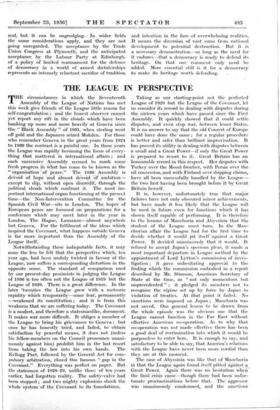THE PRICE OF DEMOCRACY
DEMOCRACY, is intrinsically a better thing than • dictatorships ; of that the great majority of people in • this country are convinced. Must it necessarily be inferior to them in efficiency ? The question is vital; for in economic and military conflicts between , States the doctrine of _survival of the fittest prevails, and the inefficient will inevitably go under. And amid all the criticisms to which the dictatorships expose themselves it is well to face the fact that they display not only certain practical advantages but certain moral advantages, which democracies lack to their detriment. They possess, to begin with, leadershipusually histrionic, some- times melodramatic, but incontestably effective. Herr Hitler has gained many of his ends by brutal and barbarthis repression, but that he has by hiS personality inspired a great part of the youth of Germany to self-sacrificing devotion to ideals far from unworthy no one who knowS anything of German- life today will deny. The same is true of Italy under MusSolini, the same of Russia, though in Rtissia creed has counted for as much as personality. HoW do we stand for leadership here? Whence dOes our youth draw its inspiration ? Where is there a national figure, politician or poet or-preacher, who can evoke the same response from the generation that will make the Britain of tomorrow as the dictators can froni the Hitlerjugend, or. the Balilla? The question cal& in Vain for answer.
The dictators have another plain advantage, Russia, . Germany and Italy all in different ways emerged frorn. the War dernoralised and humiliated. NO ordinary measures would restore , theca to a place among the nations. At any rate no ordinary measures did. _ But the drastic disciPline applied by, what was at first a small minority of ,resolute and ruthless men in the end produced results which made their nation respected for its strength, if hated for the way that strength was used. The common declara- tion that Hitler has given Germany back her soul has its element of truth, sardonic though the eulogy may sound in the light of the Jewish persecution and the Roehin murders and the tragedies of the concentration. camps. In britain we have passed through no such humiliation ; we needed no such rescue ; and we have no national saviour to salute. But the difference does not end there. Called to no tonic effort, we 'can_ too easily remain complacent and 'content—till the moment 'comes when the world • is faced with the spectacle of the dictatorships powerfnl and aggressive and the democracies disarmed -and disintegrated
, •
(as in Spain, as in Franee, as to some extent, though
. much lesS, here), by inner" conflicts to which any nation that allows freedom: to degenerate into irresponsibility must be prone. . .
To that extent, and in that respect, the dictator- ships are a challenge to the demoericies. We believe our ideals to be higher than theirs. We know On?'niethOds of achieving them-,to be more civilised and more humane.. But What. we shall achieve unleis we can _make ourselves a nation under discipline is far less certain. DiScipline . is . not 'a popular word among democracies, because is rarely thought of as self-imposed-. -When the need for it- is emphasised the demand is commonly aSSO- ciated with Fascist aspirations: So. it sometimes may be, but the fact that an advocate is 'Suspect does not vitiate his cause. Democracy is -on its _trial today, and if it is to survive it must be defended, not, we may pray, by arms, but by the demonstration
'that' it can' show itself virile, as enterprising, as
resolute, as efficient in building up a nation's physique and _ bringing within the reach of every _ citizen. a life reasonably,rounded and complete, as any.dictator: ship on earth. How far we are froni ..achieving that in this Country, where we claim tO--. exhibit democracy at its best, our uneMployment. returns, the statistics of -army rejections, the strictures of our experts on ,nutrition, damningly testify.
These,.. it is true, are merely physical criteria, and . national life, like individual, consists of mind as well'-as body. . -.But the influences of the physical on the mental, :of a healthy and developed body on a mind aspiring, however unconsciously,. . to range untrammelled,_ need no enaphasis...,Herr .Hitler is doing immensely much for the .the German- people,t,Mr. Lloyd George is only ,the latest And, mo4fClistinguished. of a number of foreign visitors who have left Gernanyprofoundlyimpressed by the value of institutions, like the Labour Camps. Herr Hitler's. task in a sense. is , simple. As he took pleasure. in- observing . at . Nuremberg, no time is wasted in discussion • no Parliament needs to be consulted ; what the Fiihrer ,conceives is done. We prefer . our .way, . where what is ill-conceived can be vetoed . or revised—so long as our -way does not mean that nothing is done at all. We need not desire to herd our :youth compulsorily into Labour Camps, but it may well be sound . policy to. make camp life worth while—particularly for the unemployed—and to persuade -youth that, it is. Submission to . discipline will be ...involved, and very wholesome discipline . it will be-7-better, con. siderably, . than .dogs and ".cup-ties and. dirt-track racing.. That is only a single example of an achieve- ment of a dictatorship .whieh a. democracy might with advantage. emulate..... It is .part of the mechanism by which Herr Hitler is welding Germany. together and .eliminating , the patronage. and . servility. and snobbery which class distinctions . too easily en- courage. We need ,not be above learning from a
dictatorship _there too.. • . „
These are deficiencies of which.,.we . are not ..00rn1 pletely unconscious. Speaking. at Portsmouth - last week the Minister of Health made necessary and effective appeal for ," a fitter Britain." He , was speaking of, the conquest of, disease - and : the cultivation of bodily. fitness, both as an end in itself and as a . means to an .end---the.. enjoyment of :the, full possibilities of an abundant life,—and he advocated the .expenditure of millions..of pounds on the, provision of such_ facilities as swimming-. pools and ..recreationgrounds..7 .-Another. form of discipline is.. called for there, the _discipline._ of ready sacrifice by. those _on ..whose. incomes a .call .must be made for such ends. The deprivation. may be real, but it can be ungrudging. In wider fields the same considerations apply, and they are. not going unregarded. The acceptance by the Trade Union Congress at Plymouth, and the anticipated acceptaAce )3y the Labour Party at Edinburgh, of a policy of limited rearmament for the defence of democracy in a world of armed dictatorships represents an intensely reluctant sacrifice of tradition
and intention in the face of overwhelming realities. It means the diversion: of vast sums from national development to potential destruction. But it is a necessary demonstration—so long. as the need for it endures—that a democracy is ready to defend its heritage. On l that one comment only need be added. More essential still is it for a democracy to , make its heritage worth defending: . •



















































 Previous page
Previous page